Cat Mother And The All Night News Boys - The Street Giveth... And The Street Taketh Away (Reissue) (1969/1997)
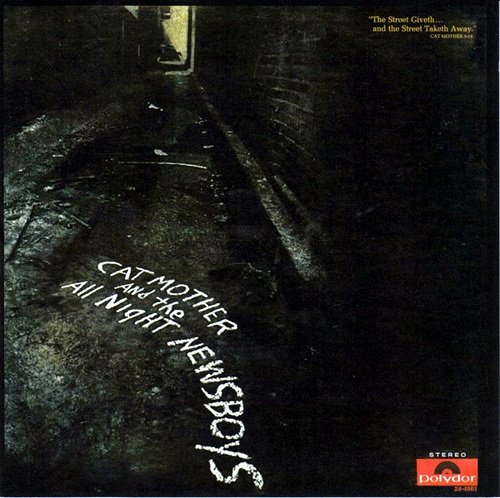
Artist: Cat Mother And The All Night News Boys
Title: The Street Giveth... And The Street Taketh Away
Year Of Release: 1969/1997
Label: Polydor
Genre: Blues Rock, Country Rock, Rock & Roll, Classic Rock
Quality: Mp3 320 / Flac (tracks)
Total Time: 49:53
Total Size: 130/320 Mb (scans)
WebSite: Album Preview
Title: The Street Giveth... And The Street Taketh Away
Year Of Release: 1969/1997
Label: Polydor
Genre: Blues Rock, Country Rock, Rock & Roll, Classic Rock
Quality: Mp3 320 / Flac (tracks)
Total Time: 49:53
Total Size: 130/320 Mb (scans)
WebSite: Album Preview
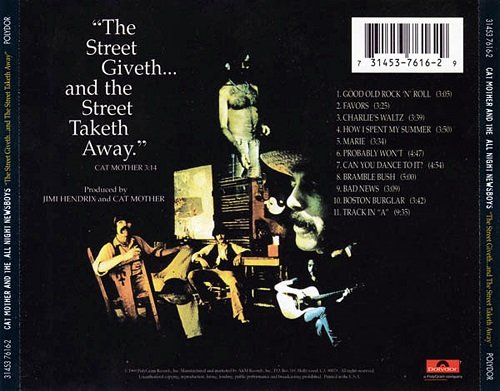
Tracklist:
01. Good Old Rock N Roll - 3:05
02. Favors - 3:25
03. Charlie's Waltz (Charlie Chin) - 3:39
04. How I Spent My Summer (Robert Smith) - 3:50
05. Marie (Robert Smith, Charlie Chin, Larry Packer) - 3:34
06. Probably Won't (Robert Smith) - 4:47
07. Can You Dance To It? (Robert Smith) - 4:54
08. Bramble Bush (Roy Michaels) - 5:00
09. Bad News (Charlie Chin, Michael Equine) - 3:09
10. Boston Burglar - 3:42
11. Track In 'A' (Nebraska Nights) - 9:35
Line-up::
Roy Michaels - Bass, Guitar, Vocals
Michael Equine - Drums, Guitar, Vocals
Bob Smith - Electric Piano, Organ, Drums, Vocals
Larry Packer - Lead Guitar , Violin, Mandolin, Vocals
Charlie Chin - Rhythm Guitar, Banjo, Vocals
Cat Mother and The All Night Newsboys was an American musical group, originally formed in New York and later based in Mendocino, California, most active in the late 1960s and early 1970s.
This is a non-descript band who went Top 25 in July of 1969 with the song "Good Old Rock & Roll," which was co-produced by Jimi Hendrix, as was this album, The Street Giveth...and the Street Taketh Away. The amusing thing about the hit single is that, despite having snippets of "Sweet Little Sixteen," "Long Tall Sally," "Chantilly Lace," "Whole Lotta Shakin' Goin' On," "Blue Suede Shoes," and "Party Doll" within its three minutes and five seconds, it is the original melody and music written by the five bandmembers which works better than the covers inside. Things do start to slide immediately, though, and the next song, "Favors," is an oddity and sounds nothing like "Good Old Rock & Roll." The keyboards become more dominant and the band begins to resemble a latter-day H.P. Lovecraft-meets-Procol Harum here. "Charlie's Waltz" takes things into even stranger directions; maybe Jimi Hendrix felt that his opening for the Monkees mandated he craft a song that sounded like "Last Train to Clarksville." Steven Roby's book Black Gold: The Lost Archives of Jimi Hendrix notes that the band opened for the Jimi Hendrix Experience in November of 1968 and that Hendrix offered production suggestions but did not play on the album. That's the pity here. Half the songs are written by the bandmembers, while the other five were composed by various combinations of the men in the group. There's absolutely no focus to the album, with a song like "How I Spent My Summer" having little relation to "Marie," the tune that follows it. Imagine the experimentation of another group from the era, Ten Wheel Drive, without the intrigue of the songs of Aram Schefrin and Michael Zager. Wonder how Hendrix amused himself while the band was recording "Probably Won't," almost five minutes of strange backing vocals over a weak melody. Side two fares a bit better. "Can You Dance to It?" is like a slowed-down answer to their hit by keyboardist Robert Smith, giving another reference to "Long Tall Sally." Squint your ears and stretch and you might hear the future style of Steely Dan in these grooves, which are competent but not very exciting. The best track next to the hit is the nine-and-a-half-minute jam "Track in 'A' (Nebraska Nights)," written by the group. Percussion and a throbbing rhythm show that the band had chops but truly squandered their golden opportunity. Roby does mention that John McDermott's book, Jimi Hendrix: Sessions, states that there are two reels of Hendrix jamming with an unknown guitarist. That would make this album a bit more interesting, for sure, as it really needed a song and vocal from Hendrix to pull it out of the bargain bins. Roby also notes that the band, represented by Hendrix's manager, Michael Jeffry (who managed Genya Ravan of Ten Wheel Drive at one point as well), opened for Hendrix at one of his final gigs in Sweden, September 1970. It was their affiliation with the guitar great that puts them in the history books and makes this LP a bit of an artifact.
This is a non-descript band who went Top 25 in July of 1969 with the song "Good Old Rock & Roll," which was co-produced by Jimi Hendrix, as was this album, The Street Giveth...and the Street Taketh Away. The amusing thing about the hit single is that, despite having snippets of "Sweet Little Sixteen," "Long Tall Sally," "Chantilly Lace," "Whole Lotta Shakin' Goin' On," "Blue Suede Shoes," and "Party Doll" within its three minutes and five seconds, it is the original melody and music written by the five bandmembers which works better than the covers inside. Things do start to slide immediately, though, and the next song, "Favors," is an oddity and sounds nothing like "Good Old Rock & Roll." The keyboards become more dominant and the band begins to resemble a latter-day H.P. Lovecraft-meets-Procol Harum here. "Charlie's Waltz" takes things into even stranger directions; maybe Jimi Hendrix felt that his opening for the Monkees mandated he craft a song that sounded like "Last Train to Clarksville." Steven Roby's book Black Gold: The Lost Archives of Jimi Hendrix notes that the band opened for the Jimi Hendrix Experience in November of 1968 and that Hendrix offered production suggestions but did not play on the album. That's the pity here. Half the songs are written by the bandmembers, while the other five were composed by various combinations of the men in the group. There's absolutely no focus to the album, with a song like "How I Spent My Summer" having little relation to "Marie," the tune that follows it. Imagine the experimentation of another group from the era, Ten Wheel Drive, without the intrigue of the songs of Aram Schefrin and Michael Zager. Wonder how Hendrix amused himself while the band was recording "Probably Won't," almost five minutes of strange backing vocals over a weak melody. Side two fares a bit better. "Can You Dance to It?" is like a slowed-down answer to their hit by keyboardist Robert Smith, giving another reference to "Long Tall Sally." Squint your ears and stretch and you might hear the future style of Steely Dan in these grooves, which are competent but not very exciting. The best track next to the hit is the nine-and-a-half-minute jam "Track in 'A' (Nebraska Nights)," written by the group. Percussion and a throbbing rhythm show that the band had chops but truly squandered their golden opportunity. Roby does mention that John McDermott's book, Jimi Hendrix: Sessions, states that there are two reels of Hendrix jamming with an unknown guitarist. That would make this album a bit more interesting, for sure, as it really needed a song and vocal from Hendrix to pull it out of the bargain bins. Roby also notes that the band, represented by Hendrix's manager, Michael Jeffry (who managed Genya Ravan of Ten Wheel Drive at one point as well), opened for Hendrix at one of his final gigs in Sweden, September 1970. It was their affiliation with the guitar great that puts them in the history books and makes this LP a bit of an artifact.
![Balkan Union - Pilgrimage (2026) [Hi-Res] Balkan Union - Pilgrimage (2026) [Hi-Res]](https://img.israbox.com/img/2026-01/22/2lfw4yvglg0vewl9vajw5143q.jpg)
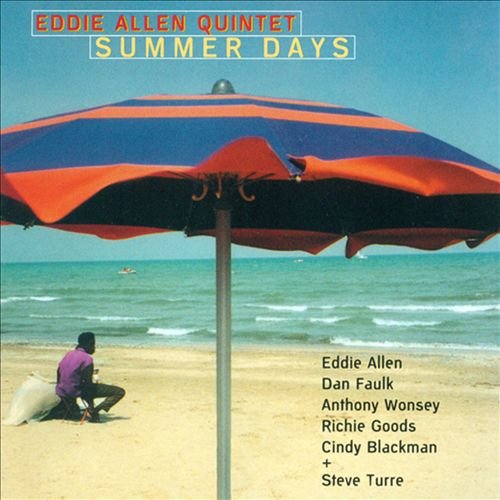
![Grzech Piotrowski - EMOTRONICA (2026) [Hi-Res] Grzech Piotrowski - EMOTRONICA (2026) [Hi-Res]](https://www.dibpic.com/uploads/posts/2026-01/1769245245_emotronica-800x800.jpg)
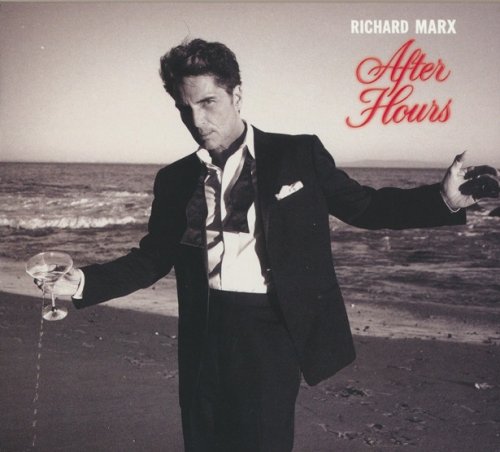
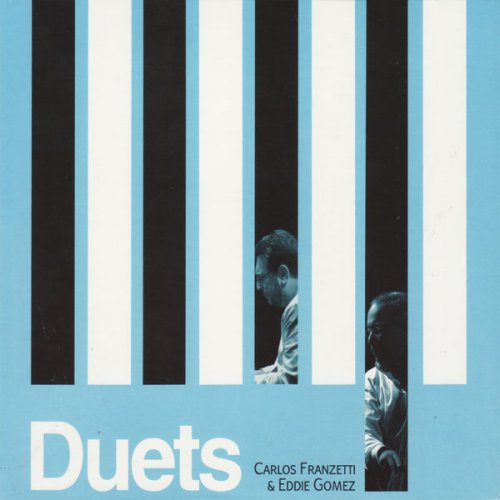
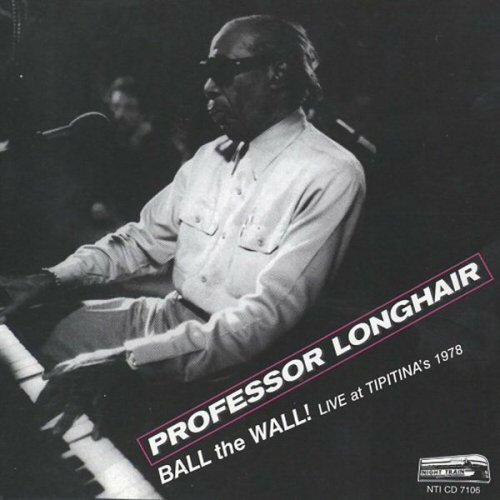
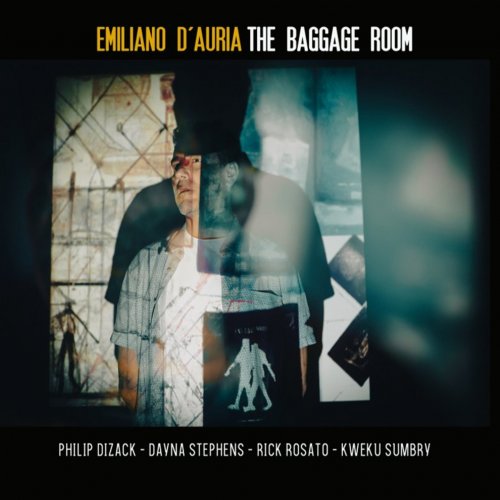
![Barezzi - ! Barezzi ¡ (2026) [Hi-Res] Barezzi - ! Barezzi ¡ (2026) [Hi-Res]](https://img.israbox.com/img/2026-01/26/uxwc4sa76myltrdxylrk0rapj.jpg)
![Bobby Hawk - Westward Leaning (2025) [Hi-Res] Bobby Hawk - Westward Leaning (2025) [Hi-Res]](https://www.dibpic.com/uploads/posts/2026-01/1769246597_cover.jpg)